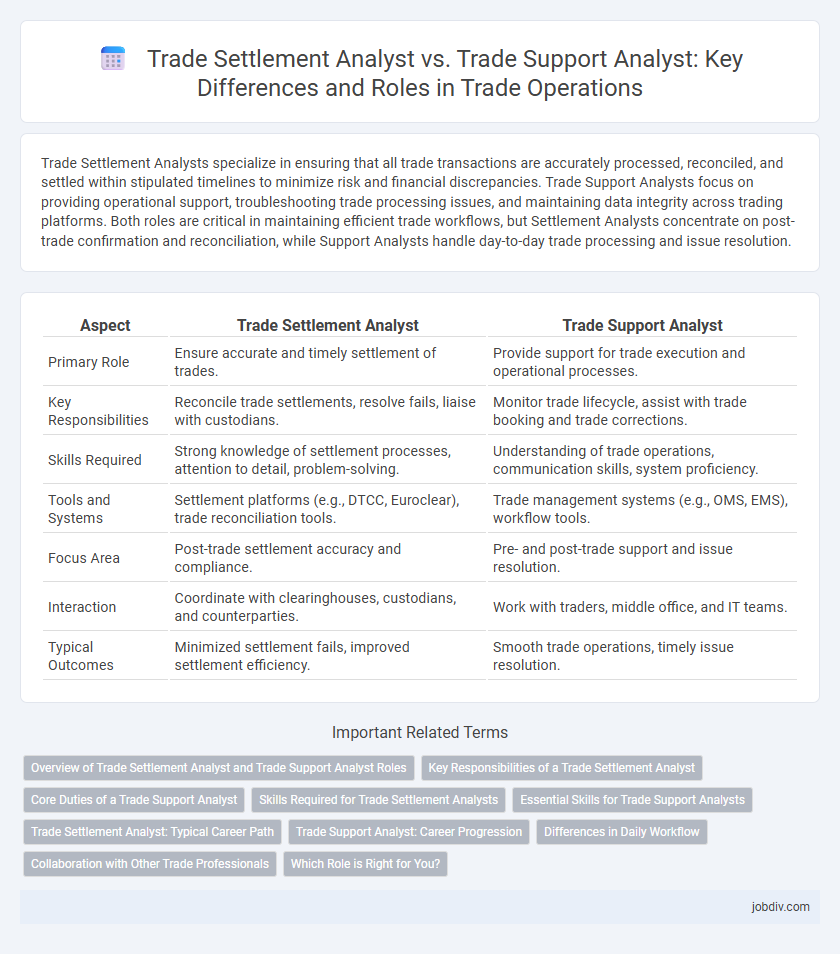Trade Settlement Analysts specialize in ensuring that all trade transactions are accurately processed, reconciled, and settled within stipulated timelines to minimize risk and financial discrepancies. Trade Support Analysts focus on providing operational support, troubleshooting trade processing issues, and maintaining data integrity across trading platforms. Both roles are critical in maintaining efficient trade workflows, but Settlement Analysts concentrate on post-trade confirmation and reconciliation, while Support Analysts handle day-to-day trade processing and issue resolution.
Table of Comparison
| Aspect | Trade Settlement Analyst | Trade Support Analyst |
|---|---|---|
| Primary Role | Ensure accurate and timely settlement of trades. | Provide support for trade execution and operational processes. |
| Key Responsibilities | Reconcile trade settlements, resolve fails, liaise with custodians. | Monitor trade lifecycle, assist with trade booking and trade corrections. |
| Skills Required | Strong knowledge of settlement processes, attention to detail, problem-solving. | Understanding of trade operations, communication skills, system proficiency. |
| Tools and Systems | Settlement platforms (e.g., DTCC, Euroclear), trade reconciliation tools. | Trade management systems (e.g., OMS, EMS), workflow tools. |
| Focus Area | Post-trade settlement accuracy and compliance. | Pre- and post-trade support and issue resolution. |
| Interaction | Coordinate with clearinghouses, custodians, and counterparties. | Work with traders, middle office, and IT teams. |
| Typical Outcomes | Minimized settlement fails, improved settlement efficiency. | Smooth trade operations, timely issue resolution. |
Overview of Trade Settlement Analyst and Trade Support Analyst Roles
Trade Settlement Analysts focus on ensuring the accurate and timely completion of trade settlements by reconciling trade details, resolving discrepancies, and liaising with counterparties to confirm transaction finality. Trade Support Analysts provide operational support by monitoring trade processes, managing trade capture, validating trade data, and troubleshooting issues to maintain workflow efficiency. Both roles require strong attention to detail, knowledge of financial markets, and proficiency in trade lifecycle management, but Settlement Analysts emphasize post-trade validation while Support Analysts concentrate on front-to-back trade processing.
Key Responsibilities of a Trade Settlement Analyst
A Trade Settlement Analyst manages the confirmation, validation, and timely settlement of securities transactions to ensure accuracy and compliance with regulatory standards. They coordinate with custodians, brokers, and counterparties to resolve discrepancies and monitor settlement cycles to mitigate risks linked to failed trades. Their role involves detailed reconciliation of trade data, settlement reporting, and supporting audit processes to maintain operational integrity within the trade lifecycle.
Core Duties of a Trade Support Analyst
Trade Support Analysts primarily focus on ensuring the accurate processing and settlement of trades by coordinating with front-office teams and middle-office operations. They reconcile trade discrepancies, manage trade confirmation and affirmation processes, and maintain data integrity across multiple trading platforms. Their core duties include monitoring trade lifecycle events to prevent fails and supporting timely resolution of settlement issues.
Skills Required for Trade Settlement Analysts
Trade Settlement Analysts require advanced skills in transaction processing, settlement lifecycle management, and reconciliation of trade discrepancies to ensure accurate and timely completion of trades. Proficiency in trade settlement systems such as SWIFT, DTCC, and Clearstream, along with strong analytical abilities and attention to regulatory compliance, is essential. Expertise in communication with counterparties, custodians, and internal teams enhances resolution of settlement fails and supports effective risk mitigation in post-trade operations.
Essential Skills for Trade Support Analysts
Trade Support Analysts require strong analytical skills, proficiency in trade lifecycle management, and expertise in resolving trade discrepancies to ensure accurate settlement processes. Mastery of trade capture systems, attention to detail, and effective communication with front-office teams are essential for timely trade validation and confirmation. Familiarity with regulatory compliance and risk management principles further enhances their ability to support seamless trade operations.
Trade Settlement Analyst: Typical Career Path
A Trade Settlement Analyst typically begins their career in entry-level roles such as trade operations or reconciliation before advancing to specialized positions focused on confirming and settling trades accurately and promptly. Progression often leads to senior settlement analyst roles, where individuals manage complex trade discrepancies, regulatory compliance, and risk mitigation. Experienced analysts may transition into trade operations management or compliance officer roles, leveraging their expertise in settlement processes and market regulations.
Trade Support Analyst: Career Progression
Trade Support Analysts gain expertise in processing trade confirmations, resolving settlement discrepancies, and maintaining regulatory compliance, forming a critical foundation for advanced roles. Career progression typically leads to Senior Trade Support Analyst, where responsibilities include leading issue resolution teams and optimizing trade workflows. With further experience, candidates can move into Trade Operations Manager or Risk Management roles, overseeing broader trade lifecycle processes and strategic support functions.
Differences in Daily Workflow
Trade Settlement Analysts concentrate on verifying and processing the finalization of securities transactions, ensuring accurate matching and timely settlement to prevent failed trades. Trade Support Analysts handle real-time transaction monitoring, resolving trade breaks, maintaining trade records, and providing operational support to front-office trading activities. The primary daily workflow distinction lies in Settlement Analysts focusing on post-trade confirmation and reconciliation, while Support Analysts emphasize trade validation and issue resolution during the trade lifecycle.
Collaboration with Other Trade Professionals
Trade Settlement Analysts collaborate closely with trade execution teams, compliance officers, and risk managers to ensure accurate and timely settlement of financial transactions, minimizing settlement failures. Trade Support Analysts work alongside traders, operations teams, and technology specialists to resolve trade discrepancies and support trade lifecycle processes, enhancing operational efficiency. Both roles require effective communication and coordination with internal and external stakeholders to maintain seamless trade workflows and regulatory compliance.
Which Role is Right for You?
A Trade Settlement Analyst specializes in confirming, reconciling, and ensuring the accurate and timely settlement of financial trades, making it ideal for those detail-oriented and focused on transaction integrity. A Trade Support Analyst manages trade flow process issues, system discrepancies, and assists front-office teams, suiting candidates who excel in problem-solving and cross-department communication. Choose the role aligning with your strengths: precision and compliance for Trade Settlement or dynamic troubleshooting and collaboration for Trade Support.
Trade Settlement Analyst vs Trade Support Analyst Infographic

 jobdiv.com
jobdiv.com